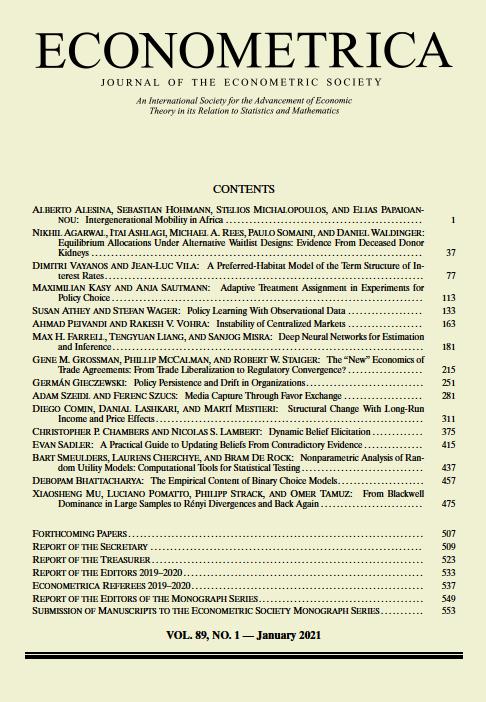社会贴现率的跨部门影响
IF 6.6
1区 经济学
Q1 ECONOMICS
引用次数: 0
摘要
在本文中,我考虑了两个规范性问题:(1) 政策制定者应如何处理涉及不同年龄组的权衡问题;(2) 政策制定者应以何种比率折现后代人的消费?我证明,在标准假设下,这两个问题是等价的:更多地关心未来意味着更少地关心老年人。即使社会贴现率和市场利率之间存在微小差异,也会对不同年龄组消费的相对价值产生重大的量化影响。本文章由计算机程序翻译,如有差异,请以英文原文为准。

The Cross-Sectional Implications of the Social Discount Rate
In this paper, I consider two normative questions: (1) how should policymakers approach tradeoffs that involve different age groups, and (2) at what rate should policymakers discount the consumption of future generations? I demonstrate that, under standard assumptions, these two questions are equivalent: caring more about the future means caring less about the elderly. Even small differences between the social discount rate and the market interest rate can have significant quantitative implications for the relative value placed on the consumption of different age groups.
求助全文
通过发布文献求助,成功后即可免费获取论文全文。
去求助
来源期刊

Econometrica
社会科学-数学跨学科应用
CiteScore
11.00
自引率
3.30%
发文量
75
审稿时长
6-12 weeks
期刊介绍:
Econometrica publishes original articles in all branches of economics - theoretical and empirical, abstract and applied, providing wide-ranging coverage across the subject area. It promotes studies that aim at the unification of the theoretical-quantitative and the empirical-quantitative approach to economic problems and that are penetrated by constructive and rigorous thinking. It explores a unique range of topics each year - from the frontier of theoretical developments in many new and important areas, to research on current and applied economic problems, to methodologically innovative, theoretical and applied studies in econometrics.
Econometrica maintains a long tradition that submitted articles are refereed carefully and that detailed and thoughtful referee reports are provided to the author as an aid to scientific research, thus ensuring the high calibre of papers found in Econometrica. An international board of editors, together with the referees it has selected, has succeeded in substantially reducing editorial turnaround time, thereby encouraging submissions of the highest quality.
We strongly encourage recent Ph. D. graduates to submit their work to Econometrica. Our policy is to take into account the fact that recent graduates are less experienced in the process of writing and submitting papers.
 求助内容:
求助内容: 应助结果提醒方式:
应助结果提醒方式:


